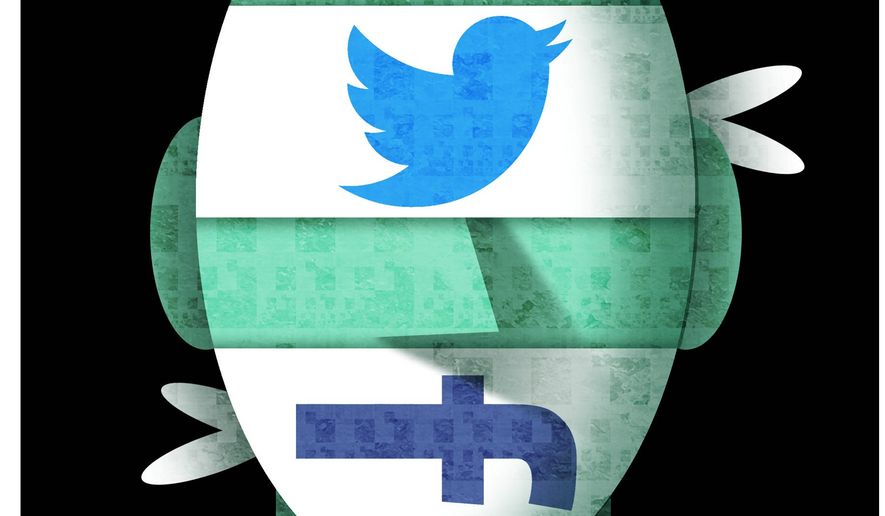OPINION:
Many of us know what the First Amendment to the U.S. Constitution says, but not many of us understand what it means.
Freedom of speech is not just another popular phrase echoed to help politicians get elected, nor is it a privilege that only applies to those comfortable in the majority. Free speech is a human right, and it’s time we stop taking our liberties in the U.S. for granted.
Americans now more than ever are getting their news and information from social media, while social media networks control what content their users interact with. Alongside Instagram and YouTube, Facebook and Twitter are currently the two largest social media platforms used to share information. While the First Amendment protects speech from government censorship, there is currently no law protecting speech from private censors.
In the spirit of limited government, the Founders understood that their powers were limited and that they could only protect the principles of free speech from government abridgment, because forcing private actors to host speech they detest would be an infringement on their right to free speech.
Censorship is alive and well, though it has taken on new forms thanks to the social media revolution. During the 2020 election, for example, major social media platforms limited access to a New York Post article that cited emails from Hunter Biden’s laptop revealing how he had introduced Vadym Pozharskyi, an adviser to the board of Burisma, to then Vice President Joe Biden. The article also included less-than flattering photographs of the president-elect’s son that were clearly intended only for private use.
In a free society, however, free speech matters. The ability to censor speech is not justification enough to censor speech, regardless of how unpopular it may be. The free flow of ideas allows us to make informed decisions. According to a poll conducted by McLaughlin & Associates, 36% of Biden supporters were unaware of any scandal regarding Hunter Biden. Nearly 5% of those polled who voted for President-elect Biden responded that they would have changed their vote had they been aware of any scandals or ongoing investigations.
Mainstream media platforms refused to cover the story entirely or, worse, reported the story as disinformation without ever investigating the claims made in the article. After Mr. Biden secured his victory, however, major news media networks, such as CNN, began covering the Hunter Biden investigation.
Another form of censorship evident during the 2020 election was the use of labels by Facebook and Twitter to warn their users of potentially misleading information. Following the election, Twitter began flagging President Trump’s tweets and tweets from any major Republican claiming that the election was fraudulent. Multiple tweets from the president were flagged with the warning, “This claim about election fraud is disputed.” Mr. Trump’s tweets regarding the election continued to be flagged, until Twitter officially “permanently suspended” the president’s account on Friday, Jan. 9.
Though many may not view Twitter’s use of labelling tweets as a form of censorship, the act discredits the text before the reader has the time to process the information. Mr. Trump’s tweets were also censored far many more times than were Mr. Biden’s. In fact, Twitter and Facebook had flagged posts from the president 65 times from May 2018 to Election Day, while zero posts from Mr. Biden during the same time frame were flagged with a warning.
While it remains unclear how effective Twitter’s method of labelling misleading tweets is, the company claimed that they saw a 29% reduction in “quote retweeting” of flagged posts. However, The Washington Post found that tweets from the president that were flagged as in dispute spread longer and faster than tweets absent a label.
YouTube announced earlier in December that they would be removing any videos falsely alleging widespread voter fraud. In the same blog post, YouTube explained that they had already “terminated over 8,000 channels and thousands of harmful and misleading elections-related videos” for violating their already existing terms of use. The majority of the videos referenced were removed before reaching 100 views.
This begs the question, what information is so misleading that it’s distribution for consideration is harmful to democracy? In order to have a fully operational democratic process, the principles of free speech must be present for us to engage in informed decision-making. If we continue to place more value on security than liberty, the democracy the nation is trying so hard to defend will collapse by the hands of its defenders. We must not silence dissent, or speech we detest. Instead, we must fight bad ideas with better ones.
• Chadwick Dolgos is a Pittsburgh journalist at Gazette 2.0. You can follow him on Twitter @thechadwickpaul.




Please read our comment policy before commenting.